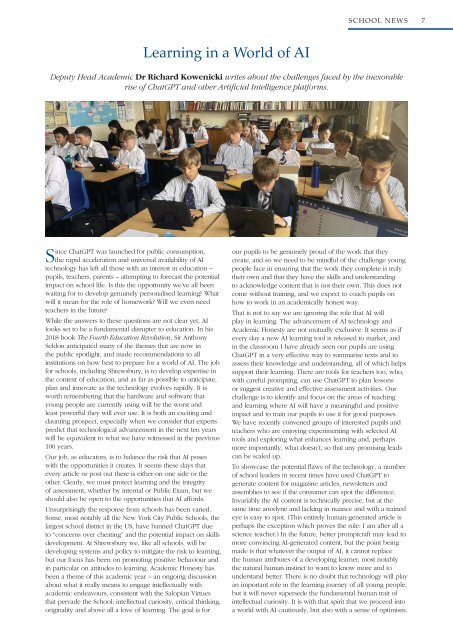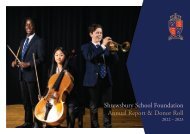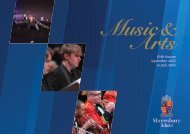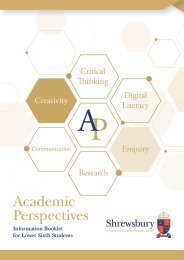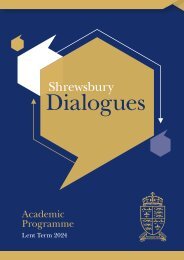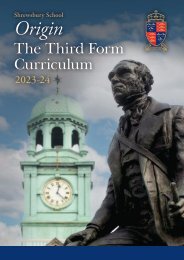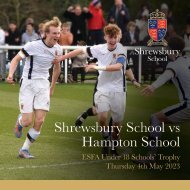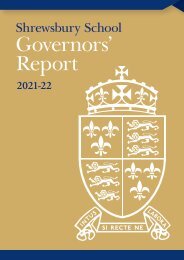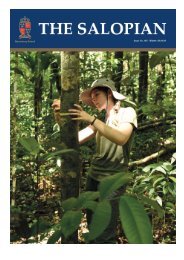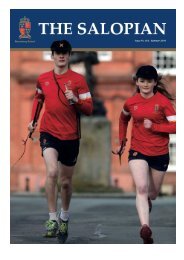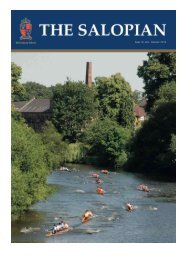The Salopian Summer 2023
v2
v2
You also want an ePaper? Increase the reach of your titles
YUMPU automatically turns print PDFs into web optimized ePapers that Google loves.
SCHOOL NEWS 7<br />
Learning in a World of AI<br />
Deputy Head Academic Dr Richard Kowenicki writes about the challenges faced by the inexorable<br />
rise of ChatGPT and other Artificial Intelligence platforms.<br />
Since ChatGPT was launched for public consumption,<br />
the rapid acceleration and universal availability of AI<br />
technology has left all those with an interest in education –<br />
pupils, teachers, parents – attempting to forecast the potential<br />
impact on school life. Is this the opportunity we’ve all been<br />
waiting for to develop genuinely personalised learning? What<br />
will it mean for the role of homework? Will we even need<br />
teachers in the future?<br />
While the answers to these questions are not clear yet, AI<br />
looks set to be a fundamental disrupter to education. In his<br />
2018 book <strong>The</strong> Fourth Education Revolution, Sir Anthony<br />
Seldon anticipated many of the themes that are now in<br />
the public spotlight, and made recommendations to all<br />
institutions on how best to prepare for a world of AI. <strong>The</strong> job<br />
for schools, including Shrewsbury, is to develop expertise in<br />
the context of education, and as far as possible to anticipate,<br />
plan and innovate as the technology evolves rapidly. It is<br />
worth remembering that the hardware and software that<br />
young people are currently using will be the worst and<br />
least powerful they will ever use. It is both an exciting and<br />
daunting prospect, especially when we consider that experts<br />
predict that technological advancement in the next ten years<br />
will be equivalent to what we have witnessed in the previous<br />
100 years.<br />
Our job, as educators, is to balance the risk that AI poses<br />
with the opportunities it creates. It seems these days that<br />
every article or post out there is either on one side or the<br />
other. Clearly, we must protect learning and the integrity<br />
of assessment, whether by internal or Public Exam, but we<br />
should also be open to the opportunities that AI affords.<br />
Unsurprisingly the response from schools has been varied.<br />
Some, most notably all the New York City Public Schools, the<br />
largest school district in the US, have banned ChatGPT due<br />
to “concerns over cheating” and the potential impact on skills<br />
development. At Shrewsbury we, like all schools, will be<br />
developing systems and policy to mitigate the risk to learning,<br />
but our focus has been on promoting positive behaviour and<br />
in particular on attitudes to learning. Academic Honesty has<br />
been a theme of this academic year – an ongoing discussion<br />
about what it really means to engage intellectually with<br />
academic endeavours, consistent with the <strong>Salopian</strong> Virtues<br />
that pervade the School; intellectual curiosity, critical thinking,<br />
originality and above all a love of learning. <strong>The</strong> goal is for<br />
our pupils to be genuinely proud of the work that they<br />
create, and so we need to be mindful of the challenge young<br />
people face in ensuring that the work they complete is truly<br />
their own and that they have the skills and understanding<br />
to acknowledge content that is not their own. This does not<br />
come without training, and we expect to coach pupils on<br />
how to work in an academically honest way.<br />
That is not to say we are ignoring the role that AI will<br />
play in learning. <strong>The</strong> advancement of AI technology and<br />
Academic Honesty are not mutually exclusive. It seems as if<br />
every day a new AI learning tool is released to market, and<br />
in the classroom I have already seen our pupils are using<br />
ChatGPT in a very effective way to summarise texts and to<br />
assess their knowledge and understanding, all of which helps<br />
support their learning. <strong>The</strong>re are tools for teachers too, who,<br />
with careful prompting, can use ChatGPT to plan lessons<br />
or suggest creative and effective assessment activities. Our<br />
challenge is to identify and focus on the areas of teaching<br />
and learning where AI will have a meaningful and positive<br />
impact and to train our pupils to use it for good purposes.<br />
We have recently convened groups of interested pupils and<br />
teachers who are enjoying experimenting with selected AI<br />
tools and exploring what enhances learning and, perhaps<br />
more importantly, what doesn’t, so that any promising leads<br />
can be scaled up.<br />
To showcase the potential flaws of the technology, a number<br />
of school leaders in recent times have used ChatGPT to<br />
generate content for magazine articles, newsletters and<br />
assemblies to see if the consumer can spot the difference.<br />
Invariably the AI content is technically precise, but at the<br />
same time anodyne and lacking in nuance and with a trained<br />
eye is easy to spot. (This entirely human-generated article is<br />
perhaps the exception which proves the rule: I am after all a<br />
science teacher.) In the future, better promptcraft may lead to<br />
more convincing AI-generated content, but the point being<br />
made is that whatever the output of AI, it cannot replace<br />
the human attributes of a developing learner, most notably<br />
the natural human instinct to want to know more and to<br />
understand better. <strong>The</strong>re is no doubt that technology will play<br />
an important role in the learning journey of all young people,<br />
but it will never supersede the fundamental human trait of<br />
intellectual curiosity. It is with that spirit that we proceed into<br />
a world with AI cautiously, but also with a sense of optimism.


